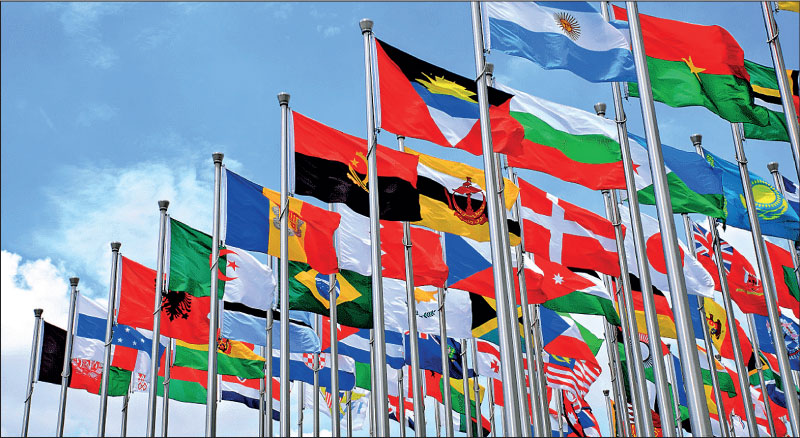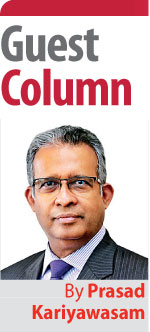Monday Feb 16, 2026
Monday Feb 16, 2026
Thursday, 23 June 2022 00:10 - - {{hitsCtrl.values.hits}}

 Sri Lanka’s external relations are a part of its history, often replete with myth and legend as well. Foreign relations of Sri Lanka in the modern era are mostly a function of post-independence developments in the country. Nevertheless, the impact of historical narratives on the psyche of Sri Lankans has been a factor when they react and respond to modern external developments that relate to their needs and aspirations as well as perceived values and beliefs.
Sri Lanka’s external relations are a part of its history, often replete with myth and legend as well. Foreign relations of Sri Lanka in the modern era are mostly a function of post-independence developments in the country. Nevertheless, the impact of historical narratives on the psyche of Sri Lankans has been a factor when they react and respond to modern external developments that relate to their needs and aspirations as well as perceived values and beliefs.
In this context, Sri Lanka, in the early years after Independence was busy unshackling its colonial past and reviving its local socio-cultural identities that were for long perceived as having been neglected, and carving its own niche in the post-world war and post-colonial era of the rapidly industrialising world. Being the first democracy in Asia with a relatively strong economy at the time of independence, enabled and may have compelled early elected leaders of Sri Lanka to focus more on human welfare and national pride and integrity, rather than a viable long-term economic and social development trajectory with a view to making Sri Lanka a developed nation in quick time similar to the path followed by countries like Japan, South Korea, and later Singapore.
Meanwhile, the Cold War years of international politics coupled with its competing capitalist and socialist economic models peddled by its main protagonists had an impact on newly independent nations including Sri Lanka. International alliances were being formed as a product of the raging Cold War between the United States and the Soviet Union vying for supremacy in economic and social systems of the world. In this milieu, like most nations in Asia and Africa, Sri Lanka too chose to remain ‘‘non-aligned’’ in line with what was perceived as enlightened self-interest of an emerging nation.
In later years, the Soviet Union collapsed, and various socialist models of governance imploded. The United Nations Organization and its specialised agencies received universal recognition as the primary global norm setting institutions of the world. The advent of the technology era, superimposing the industrial era, catalysed the globalisation of economies and societies. Migration for work and seeking greener pastures became a global phenomenon. Terrorism as a means of fighting for communal and political grievances raised its ugly head in various trouble spots in the world, but the global consensus against such unbridled violence paved the way to eradicate or mitigate such threats to nations.
Civil society organisations and non-state actors like Multi National Corporations (MNCs) became major stake holders in global commons. Citizens of the world except in a few outlier nations were empowered as a result of the communication revolution, and fundamental freedoms became no more mere rhetoric of social elites, but rights actually exercised by citizens in democratic nations. All these phenomena spanning a period of several decades since the cold war years, engendered substantial and dynamic changes in the course and content of international relations, often described vividly in academic terms.
In this backdrop, the question arises as to how well Sri Lanka can leverage its international relations in this modern era, especially in the 21st century, primarily for securing economic and social interests of the people of the country in keeping with the times.
Sri Lanka’s natural assets like geographical location and nature’s bounty of fauna and flora are well-known since ancient times, including in recorded interactions with the Roman and Asokan empires. While all this can be leveraged for local benefit, no such asset including modern era human resource capacities of Sri Lanka will become automatically beneficial to the country unless they are backed by physically robust infrastructure and internationally recognised transparent and trustworthy regulatory mechanisms.
For building such physical and regulatory infrastructure, it is best for Sri Lanka to be multi-aligned with nations and entities that currently hold and wield global economic levers. This requires a sophisticated web of external relationships not driven by glib rhetoric, but a well-thought-out and carefully crafted foreign relations approach. It must be a dynamic policy framework and not a set of archaic political ideas that are based on habit and presumptuous assumptions of self-importance removed from local and international ground realities.
Such a policy approach must be both strategic in content for long-term benefit and tactical in application for short-term advantage, but in line with national interests and aspirations of the public belonging to all communities in the country. It does not matter if relationships and policies that Sri Lanka pursue for thriving economically and socially are called names such as “bandwagoning”, “alignments”, “kowtowing”, or “appeasements” as long as such policies are directed towards making Sri Lanka a commercially thriving and politically independent hub nation in the Indo-Pacific region, benefiting all citizens of our country.
In this regard, foreign policy decision-makers of the country have an unenviable task of clearly and cleverly discerning international developments and evolving policies dynamically, in tandem with political, economic, and social imperatives of the day, arising out of Sri Lanka’s ingrained democratic traditions and available physical and human resource structures. Ideological baggage as well as social and ethnic prejudices of yester years must be abandoned. They must be replaced by universally accepted value systems that prevail in modern democracies. Fully embracing them will, no doubt, make Sri Lanka an attractive destination for thriving and prosperous international communities to visit and to do business.
Respect for human dignity and rights, as well as primacy of accountability and law and order in all aspects must be embraced and upheld as precious local assets. Such an approach will not only act as a catalyst for attracting international attention and support, but will enable Sri Lankan envoys, citizens and business persons to profile the country effectively as an attractive destination to invest and to live and work.
Key phenomena like cutting edge technical know-how of the ongoing technological revolution and robust global supply chains that intersect Sri Lanka can be leveraged to consolidate Sri Lanka’s position as a vibrant hub in the Indo-Pacific. Measures must be initiated for evolving education institutes on par with international standards, both public and private, with foreign collaboration, as and when required. Regional cooperation, encompassing the region and beyond must be leveraged to accentuate Sri Lanka’s hub status in the Orient.
It must be recognised that in today’s globalised cyber connected world, sovereign equality of nations is somewhat nuanced. An effective network of external relations cannot be built on presumptions of absolute sovereign equality. Instead, it should be a deftly designed asymmetric balancing of strategic interests based on political, economic and social imperatives of the country.
Sri Lanka, in this context, needs a foreign policy that is dynamic in approach and modern in its outlook and content, and in line with the evolving aspirations of the people and compulsions of the 21st century. It must be transformative with a multi-aligned network of relations for sustained strengthening of bonds and friendship with all key nations and entities of the world. The upheaval or ‘the Aragalaya’ is a manifestation that youth and citizenry in general are united in demanding a transformed nation, and foreign policy is an essential element in this transformation.
(The writer is former Foreign Secretary, Ambassador to USA, High Commissioner to India, Ambassador/PR to UN in Geneva and New York.)